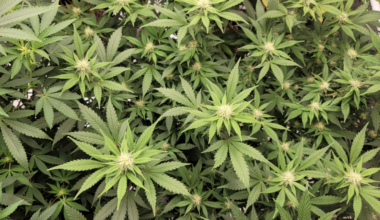The East Lansing, Michigan City Council narrowly rejected a resolution to effectively decriminalize psychedelics in the jurisdiction on Tuesday, with the mayor and city attorney voicing concerns about possible legal ramifications of the reform proposal.
Local lawmakers voted 3-2 to defeat the measure, which would have made prosecutions of people over growing, possessing and distributing entheogenic substances like psilocybin and ayahuasca among the city’s lowest law enforcement priorities.
The whereas section of the resolution stated that psychedelic plants and fungi “can benefit psychological and physical wellness, support and enhance religious and spiritual practices, and reestablish humans’ relationship to nature.”
They can also “catalyze profound experiences of personal and spiritual growth, have been shown by scientific and clinical studies and traditional practices to be beneficial to the health and well-being of individuals and communities in addressing” certain mental health conditions, it continued.
“Therefore, be it resolved, that the City Council of the City of East Lansing declare that it shall be a policy of the City of East Lansing that the investigation and arrest of persons for planting, cultivating, purchasing, transporting, distributing, engaging in practices with, or possessing Entheogenic Plants as defined herein and including the aforementioned compounds thereof, shall be the lowest law enforcement priority for the City of East Lansing.”
Mayor Ron Bacon said before the vote that he felt the resolution was “well-structured.” However, he said that it “ends up being very performative in a way” because it does not change overarching state laws that would continue to criminalize psychedelics.
The mayor agreed that testimonials on the therapeutic potential of psychedelics are “powerful and real,” but he sided with the city attorney with respect to his concerns about the selective enforcement approach prescribed under the resolution.
“I see a great deal of jeopardy in this and challenges—and I despise the grey areas because it just creates one-offs,” he said. “My reservations are on the legality, not on the rights of the individual.”
City Attorney Anthony Chubb told councilmembers that his main concern about the measure was that it would direct police to selectively enforce state and federal drug laws.
He argued that there were “potential legal consequences and liabilities that the city could endure from doing that, and from when this honorable body uses its power to determine which laws we should and shouldn’t selectively enforce—whether it’s the ones that are before us today or any others that it might do so in the future.”
Other members pointed out that there haven’t been any reported legal consequences for other localities in Michigan and elsewhere in the country that have enacted similar psychedelics reform measures.
“I know great individuals who do well in our community, in our town, who use [psychedelics], and I don’t think any of those people should be caught up in the criminal system,” Councilmember Dana Watson said. “I also think it’s a message to the Ingham County prosecutor about where we stand, or what we’re thinking about, what the police should be doing or charging.”
—
Marijuana Moment is already tracking more than 1,000 cannabis, psychedelics and drug policy bills in state legislatures and Congress this year. Patreon supporters pledging at least $25/month get access to our interactive maps, charts and hearing calendar so they don’t miss any developments.![]()
Learn more about our marijuana bill tracker and become a supporter on Patreon to get access.
—
Mayor Pro Tem Jessy Gregg echoed that point, saying “what we’re really doing is sending a message.”
“We’re creating one more link in the chain…similar to the way that marijuana has been legalized,” she said.
While Tuesday’s vote represents a setback in East Lansing, reform advocates have been especially active in Michigan in recent years, and Decriminalize Nature Michigan and their coalition partners are currently collecting signatures to place psychedelics legalization on the state’s November ballot.
There was some discussion after the Council vote about possibly revising the resolution to be less prescriptive about enforcement policies for policy and more generally voice support for the statewide reform effort.
Julie Barron, co-director of Decriminalize Michigan, told Marijuana Moment that while advocates are “disappointed” in the outcome of the vote, the Council’s discussion overall represented a “step in the right direction.”
“We had a very big turnout of community members showing support, and four of five East Lansing City Council members spoke of their support for the movement,” she said. “They were very moved by the testimonials and speeches and agreed that people who want access to these plants and fungi should have it.”
“Ultimately it sounds like this decision was highly influenced by the police and the city attorney who told council that they, in theory, couldn’t selectively enforce state or federal law and that this could cause confusion for law enforcement,” Barron said. “The win here is that we had a powerful discussion and a strong educational moment in city government.”
East Lansing is the first Michigan city where psychedelics decriminalization has been formally brought before local lawmakers and failed.
In March, the Hazel Park City Council unanimously approved a resolution to decriminalize psychedelics like psilocybin and ibogaine.
Detroit voters approved a ballot initiative to widely decriminalize psychedelics in November.
The Ann Arbor City Council previously elected to make enforcement of laws prohibition psychedelics like psilocybin, ayahuasca and DMT among the city’s lowest priorities—and lawmakers then followed up by declaring September Entheogenic Plants and Fungi Awareness Month.
After local legislators passed that decriminalization resolution in 2020, the Washtenaw County prosecutor announced that his office will not be pursuing charges over possessing entheogenic plants and fungi, “regardless of the amount at issue.”
Last year, the Grand Rapids City Council approved a resolution supporting the decriminalization of a wide range of psychedelics. However, the measure fell short of what activists had hoped, in that it doesn’t actually change any city enforcement practices and merely expresses support for future reforms.
A pair of state senators also introduced a bill in September to legalize the possession, cultivation and delivery of an array of plant- and fungi-derived psychedelics like psilocybin and mescaline.
Outside of Michigan, psychedelics reform is being pursued in state legislature and at the ballot in states across the country.
For instance, Colorado activists are also working to place competing initiatives to legalize psychedelics on the state’s November ballot, with one campaign saying recently that it’s already collected nearly half of the required signatures needed to qualify its measure.
Colorado Gov. Jared Polis (D) was recently asked about the prospects of enacting psychedelics reform in the state, and he acknowledged that advocates are working to accomplish that policy change at the ballot and also said he supports the idea of decriminalizing the substances.
He will also have a chance to sign a more modest psychedelics reform bill into law after the legislature sent him a measure to align state statute to legalize MDMA prescriptions if and when the federal government ultimately permits such use.
The governor of Connecticut recently signed a large-scale budget bill that includes provisions to set the state up to provide certain patients with access to psychedelic-assisted treatment using substances like MDMA and psilocybin.
Maryland lawmakers have sent a bill to the governor that would create a state fund to provide “cost-free” access to psychedelics like psilocybin, MDMA and ketamine for military veterans suffering from post-traumatic stress disorder (PTSD) and traumatic brain injury.
The Maine Senate approved a bill last month to to create a medical psilocybin program in the state, but the House of Representatives refused to go along.
Also last month, Georgia lawmakers advanced a bipartisan resolution that calls for the formation of a House study committee to investigate the therapeutic potential of psychedelics like psilocybin and make recommendations for reforms.
The governor of Utah signed a bill in March to create a task force to study and make recommendations on the therapeutic potential of psychedelic drugs and possible regulations for their lawful use.
A Missouri House committee also held a hearing that month on a GOP-led bill to legalize a wide range of psychedelics for therapeutic use at designated care facilities while further decriminalizing low-level possession in general.
The Washington State legislature recently sent a budget bill to the governor’s desk that includes a proposal to direct $200,000 in funding to support a new workgroup to study the possibility of legalizing psilocybin services in the state, including the idea of using current marijuana regulatory systems to track psychedelic mushrooms.
In March, the Hawaii Senate approved a bill to set up a state working group to study the therapeutic benefits of psilocybin mushrooms and develop a “long-term” plan to ensure that the psychedelic is accessible for medical use for adults 21 and older.
Also that month, the Oklahoma House of Representatives passed a bill to decriminalize low-level possession of psilocybin and promote research into the therapeutic potential of the psychedelic.
Rhode Island lawmakers introduced a pair of drug decriminalization bills in March—including one focused on psilocybin and buprenorphine that would authorize doctors to prescribe the psychedelic mushroom.
An Oregon Senate committee also recently advanced a bill to ensure that equity is built into the state’s historic therapeutic psilocybin program that’s actively being implemented following voter approval in 2020.
A bill to decriminalize a wide array of psychedelics in Virginia was taken up by a House of Delegates panel in January, only to be pushed off until 2023. A separate Senate proposal to decriminalize psilocybin alone was later defeated in a key committee.
California Sen. Scott Wiener (D) told Marijuana Moment in a recent interview that his bill to legalize psychedelics possession stands a 50/50 chance of reaching the governor’s desk this year. It already cleared the full Senate and two Assembly committees during the first half of the two-year session.
Washington State lawmakers also introduced legislation in January that would legalize what the bill calls “supported psilocybin experiences” by adults 21 and older.
Meanwhile, a Pennsylvania bill meant to promote research into the therapeutic potential of psilocybin mushrooms for certain mental health conditions may be in jeopardy, with the sponsor saying that the chair of a key House committee is expressing reservations even after the legislation was amended in an effort to build support.
New Hampshire lawmakers filed measures to decriminalize psilocybin and all drugs.
Legislation was also enacted by the Texas legislature last year requiring the state to study the medical risks and benefits of psilocybin, MDMA and ketamine for military veterans in partnership with Baylor College of Medicine and a military-focused medical center.
At the congressional level, bipartisan lawmakers sent a letter to DEA in January, urging that the agency allow terminally ill patients to use psilocybin as an investigational treatment without the fear of federal prosecution.
Activists and patients were arrested at the DEA headquarters on Monday after engaging in civil disobedience during a protest over the agency’s refusal to provide a waiver granting those patients access to psilocybin under Right to Try laws.
Georgia Voters Approve Marijuana Legalization Ballot Question
Photo elements courtesy of carlosemmaskype and Apollo.
Medical Disclaimer:
The information provided in these blog posts is intended for general informational and educational purposes only. It is not a substitute for professional medical advice, diagnosis, or treatment. Always seek the advice of your physician or other qualified healthcare provider with any questions you may have regarding a medical condition. The use of any information provided in these blog posts is solely at your own risk. The authors and the website do not recommend or endorse any specific products, treatments, or procedures mentioned. Reliance on any information in these blog posts is solely at your own discretion.







